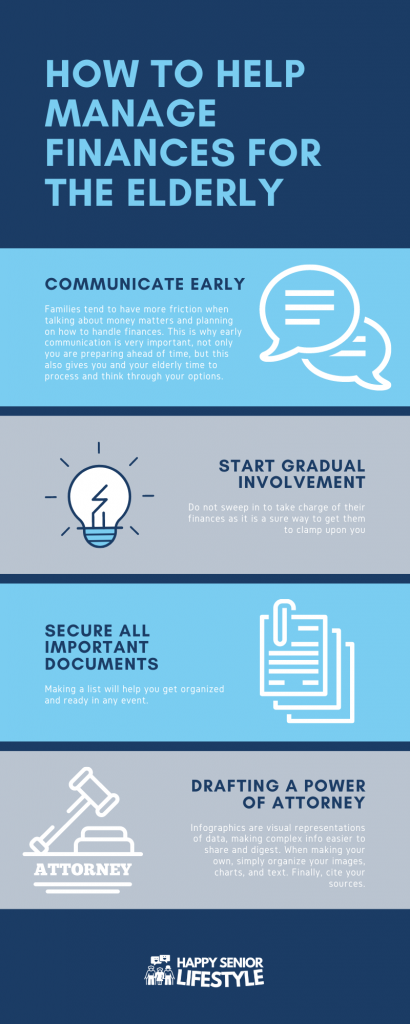The future holds a lot of uncertainty for most people, especially for those who have elderly loved ones who might one day need more delicate care and support.
For some, it may be their parents, others grandparents. One day they may not be able to handle responsibilities themselves and may be hesitant to ask for assistance when the time comes for the fear of shame or fear of being a burden to the younger family members. But planning for their future especially future financial needs has to be addressed as soon as possible. The longer you wait, the harder it would be to start preparing, or it might even be too late.
Manage finances for the elderly while it’s early although it is a sensitive matter that can be approached well with open and honest communication. Here are some steps on how to start preparing for money management for seniors. You can call it senior money hacks, but these are sure ways to be prepared for the future.

Communicate early
Anything about finance is a delicate matter whomever you are talking to. Families tend to have more friction when talking about money matters and planning on how to handle finances. This is why early communication is very important, not only you are preparing ahead of time, but this also gives you and your elderly time to process and think through your options.
Telling your elderly your concerns on their future financial stability may be faced with either appreciation or anger. Talking to them as early as now will also provide time for emotions to be processed. The goal is to start as soon as possible. The National Institute on Aging suggests designating a family member who will be given in advance written consent from parents about their financial and health documents. This preplanning may be done with professionals involved including doctors and lawyers.
Understanding your elderly’s financial landscape as early as now will provide you a better knowledge of how you will be involved in the care and carrying out their financial responsibilities in the future.
Start gradual involvement
Starting with some involvement with financial tasks with your elderly is one of the ways you can transition gradually. Do not sweep in to take charge of their finances as it is a sure way to get them to clamp upon you. Little by little provide support on simple financial matters such as writing checks with them, going to the bank with them, or being with them in other financial decisions. Making sure you are together with your elderly on some of these financial processes you are learning how they want their financial matters handled, and you are providing them time to adapt and get used to your support.
Secure all important documents
Start listing your elderly’s important information and documents like important contacts, doctors, lawyers, insurance policies, account numbers, deeds, etc. Making a list will help you get organized and ready in any event. Also doing an inventory will help you see if there are any documents in need of updating and seeing that all accounts are in good status.
Take care of bills and other financial responsibilities
Your parents might still be paying their bills traditionally, making physical deposits, and paying over the counter. This is one of the important things you have to settle with them. Let them know that you want to help them get their bills paid automatically through payment systems available. That way they will save time and energy going to the bank and it also prevents the risk of them having overdue balances if and when they are not able to process these bills personally.
Drafting a Power of Attorney
Having your elderly sign a power of attorney might be one of the hardest things you can face when trying to prepare for their future. Some elderly may view this as a threat of signing off their entire life to you, but it is a sure way to be legally able to help them.
A power of attorney is a very important document that will help your elderly decide on how much or what decisions you can make on their behalf when they are not able to make decisions themselves in the future. This includes financial and medical decisions crucial to their wellbeing. While this may be a scary document for them to sign, assure them that it is in their best interest to have this written out. They have the power to decide what is the only portion of their finances or medical decisions they are able to control in the future. They can also narrow down the circumstances limiting your power to help them in the future.
Document and communicate all the steps you are taking
While you are in the process of helping your elderly prepare for their future, it is in your best interest to document the steps you are taking, the people you are dealing with, and the changes you are making. Communicate these to your elderly to help them understand that what you are doing is for their good and that they may be able to trust you all the more. This can also prevent misunderstandings, doubt, and other problems that may arise in the process.
Separate your finances
Never mix your finances with your elderly in the process of helping them. This is a bad idea that can cause problems and conflicts within the family. Keeping your finances separate will help you not jeopardize your own finances, and make you even more trustworthy. For your elderly, this is a sign of respect and clears out any doubt or bad motive on your side.
Conclusion
Helping manage finances for the elderly is one of the hardest but most important processes you can go through with your elderly loved one. Preparing for their future is as important as taking care of them now, if not more. This ensures they will be able to enjoy their retirement and that everybody has peace of mind in the future.
